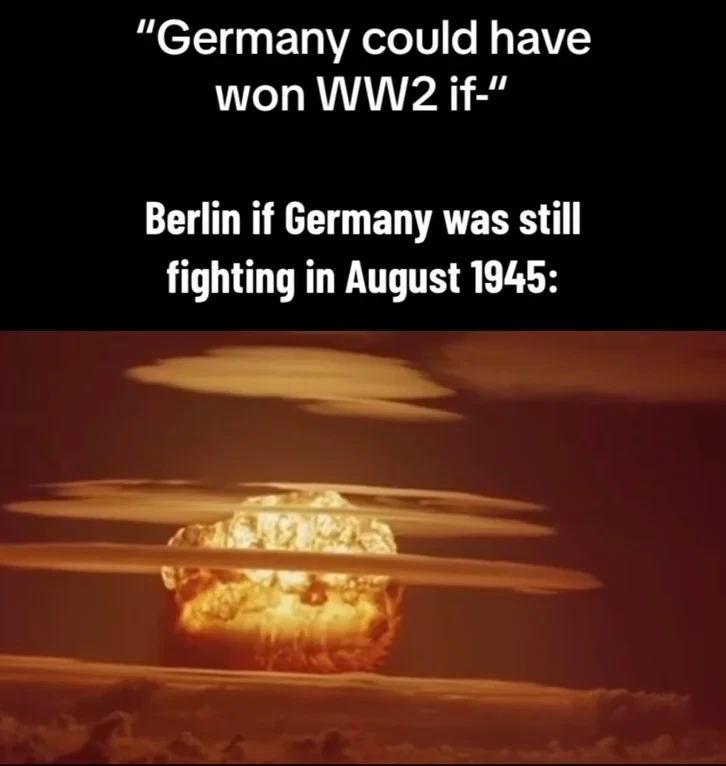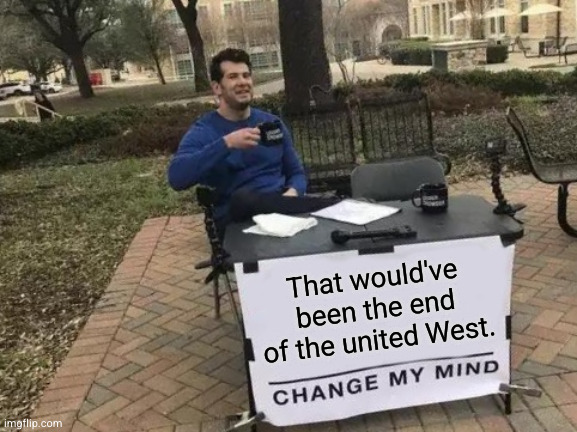Germany could have won WW2 if they had appealed better to Americans and convinced them to join the Nazis.
History Memes
A place to share history memes!
Rules:
-
No sexism, racism, homophobia, transphobia, assorted bigotry, etc.
-
No fascism (including tankies/red fash), atrocity denial or apologia, etc.
-
Tag NSFW pics as NSFW.
-
Follow all Piefed.social rules.
Banner courtesy of @setsneedtofeed@lemmy.world
It would have been easier than that; they had a non-aggression treaty with Russia that they broke. Had they not done that, Russia likely would not have joined the Allies, and it's not out of the question that they might have joined the Axis.
That wouldn't guarantee an Axis win, but without nuclear weapons, the Allies wouldn't be able to sustain a land war against a Germany/Russia alliance.
If Hitler hadn't declared war on the US, we may have only focused on Japan. Fortunately for Roosevelt things evolved in just 3 days from 'holy shit japan attacked us' to 'we're gonna beat the whole fucking world to death with superior manufacturing'. good thing there's absolutely NOTHING either japan nor germany can do to bomb detroit or the rest of US production. Pretty soon liberty ships are coming off the line in numbers that ensure the germans can never stop aid to the UK. And japan - sure they sunk a bunch of nice (but obsoleted by carriers) battleships but that's pretty much where it ends in terms of punishing US installations.
There were already skirmishes between US ships and German u-boats for well over a year before US was bombed at Pearl Harbor. So, even if Pearl Harbor didn't happen, there is another Lusitania moment waiting to happen for US to justify declaring war on Germany.
(As a side note, the bit of history on US and German naval skirmishes before Pearl Harbor seems to be getting sidelined and unknown by those who weren't alive at the time)
valid, the wolfpacks had the entire east coast mapped out and were chomping to attack more US shipping. BUT. imho this simply illustrates how stupid hitler was. Picking a fight with the ally of your enemy to stop just supplying and start shooting stops working rapidly as liberty ship production outpaces the german's ability to sortie subs (and of course we were reading their comms eventually, making it a turkey shoot). it's like the japanese and germans thought they had some magic way they'd keep the rust belt out of the war and oops, that kinda destroyed them. our ability to endlessly manufacture new and better shit as the war went on, and their inability to hurt production at all while theirs was being destroyed... history is full of "what were they thinking?" moments in hindsight.
Oh and the US probably shouldn't have strangled Japanese with oil embargos which probably precipitated actual hostilities.
Russia likely would not have joined the Allies
The USSR spent the previous decade trying to build an antifascist pact and was snubbed as the western powers signed their own non-aggression pacts with Germany. They pledged to send 1 million troops to invade Germany if the western powers would support them. Instead the western powers handed over Czechslovakia to Germany and Poland, hoping they would go east and deal with the greater threat, communism.
The USSR didn't sign a non-aggression-pact with Germany because they wanted their number one enemy to succeed, but because it was the only way to draw the western powers in against Germany. Hell Britain was only stopped from sending troops to invade the USSR during the Winter War on the side of the axis by Sweden denying them transit.
The Man in the High Castle is set in an alternate timeline where the Germans did win the war by developing nukes first. They then bombed DC, leading to the US surrendering. Germany then took over Europe, Africa and most of the Americas while Japan conquered Eastern Asia, Oceana, and the American West Coast.
But in reality, it was not a close race. The Manhattan Project was invested in heavily due largely from fears that Germany would develop nuclear weapons first, but their Uranproject had largely been abandoned by the time the US started their equivalent. German physicists first discovered nuclear fission, and their government began seeking how to develop a bomb shortly after. However, Germany essentially gave it up as unachievable in the near term as they never managed to achieve a chain reaction or even enrich Uranium. Secret recordings show their scientists did not initially believe the news about Hiroshima, thinking it impossible with then-modern technology.
They did come fairly close to developing the first nuclear reactor however, as scientists were still interested in civilian if not military applications. It's interesting that today Germany houses US nuclear weapons for defense as part of NATO but has a population firmly opposed to nuclear power.
It’s interesting that today Germany houses US nuclear weapons for defense as part of NATO but has a population firmly opposed to nuclear power.
The West German civilian reactor program was just meant to cover the development of all the parts needed to develop nuclear weapons. The Soviets ran a massive propaganda campaign against it and the Western allies did not like the idea that Germany, which recently did invade most of Europe, had nuclear weapons. However the fear of West German politicans of Soviet invasion was somewhat justified, so to calm them down the US station US weapons in West Germany as a sort of insurance. However you do not need nuclear reactors to built nukes with highly enriched uranium, but just an enrichment plant and the ability to put a nuke together. Guess which parts of the civilian reactor program are still around.
You know it's an American movie because it depicts the USA as being a threat to Germany lol. Moscow would have been bombed first, and England second.
I kinda agree with you but taking the US out of the war wouldn't have been a stupid objective as they were a manufacturing powerhouse keeping aid flowing to Britain and other allies.
Would have probably taken a few more months, since only 2 nukes existed in August of 1945.
there was a third, which was scheduled to be dropped on 19 August. That bomb became the demon core.
We should have just like Sherman should’ve turned west from Savannah and not stopped until he reached the Pacific. No more half measures
Morgenthau 🫱🫲 Sherman
The only way Germany was winning the war was if they got a whole new leadership structure that didn't rely on a cult of personality.
The Nazi bureaucracy was deliberately convoluted, which paralysed decision making. The OKW oversees the Western theatre of Europe, while the Heer looks after the Eastern front. The OKW is officially the general staff who should lead the overall operations of all branches of the military, but the Heer was given the duplicate responsibility on the Eastern front. So, there was competition between the allocation of resources for both organisations and the prioritisation was divided and inefficient.
Edit: mix up between OKW and Heer
I would not be alive had it come to that. My dad was born in 1944 in Berlin.

